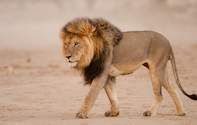
Name
Lion [Panthera leo]Appearance
A male lion is 1.2m tall at the shoulders and has a mass of up to and over 200 Kg. Female lions (lionesses) are slightly smaller and weigh about 130 Kg. Their underparts are whitish with a general tawny to sandy tinge.
Rosettes and spots are characteristic of young animals and females often retain these on their underparts. Only males have a long tawny mane on the sides of the face and on top of the head. In some individuals this mane can become almost black.
Diet
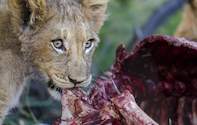
Lions prey mainly on large animals such as Zebra, Wildebeest, Buffalo, Gemsbok and even Giraffe. Smaller prey like Impala, Steenbok and even Porcupine are taken when the opportunity arises. The task of hunting is often left to the lionesses of the pride, which hunt as a team.
Lions can be opportunistic feeders which includes anything from a mouse to an elephant. They will sometimes follow other predators or vultures to the location of kill sites to steal their food.
Breeding
Lions are non-seasonal breeders, yet females of a pride often synchronize births. After a gestation period of 110 days, one to four cubs are born. Cubs start taking meat after ten weeks. Females suckle their own and one another's cubs for up to six months.
After birth, lion cubs are hidden for six weeks after which mothers bring them to the pride's crèche. The young remain dependant on the organizational success of the pride for up to three years.
Behaviour
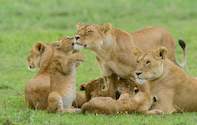
Prides consist of two to 12 related females and their young, and dominant males. Such males may form coalitions of two to six, and collectively hold tenure over prides. The roar of the Lion is an impressive sound and is perhaps the sound most associated with the African wild. Apart from roaring,
Lions also communicate by scent-marking their surroundings, and even by their facial expressions and body postures. Lions display their aggression by showing their impressive canine teeth, retracting their ears and displaying the dark patch behind the ears, their tails twitching in irritation.
Where Are African Lions Found?
African lions are found in Sub-Saharan Africa - this is the last refuge of these supreme animals and South Africa offers some of the best opportunities to view lions in their natural habitat. One of the best places to see lions is in Kruger National Park which is home to the Big Five.
Camp Shawu is one of the best place to see lions in Kruger National Park
African Lion Facts
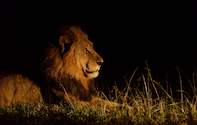
- Lions hunt mostly at night under the cover of darkness, however, they will hunt during the day if an opportunity arises.
- Lions roar mostly at night when they are most active and sound carries further - the roar of a lion can carry over seven kilometers.
- Mature male lions have impressive large manes of hair around their necks and shoulders, designed to make them look large and impressive to females as well as contenders.
- Lions have black on the tips of their tails which is the perfect height for a lion cub to follow a lioness through tall grass.
- All the lionesses in a pride are related and remain within the lion pride for life.
- Lionesses frequently synchronize their breeding, which serves a useful purpose, as all the mothers are able to mutually suckle each other's cubs.
- Lions are known to be exceptionally lethargic and spend about twenty hours a day resting, which is required to rest after intense periods of patrolling and hunting.
- Lions have extremely rough tongues that have the ability to separate meat from bone by just licking it.
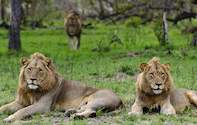
Best Place to See Lions

Kruger National Park in South Africa is home to a large African lion population. Camp Shawu is one of the best places to see Lions in Kruger National Park. The lodge overlooks a dam that attracts lions and a multitude of wildlife.
Where to See White Lions?

The extremely rare and beautiful white lion can be seen in Timbavati Private Nature Reserve which is the only place in the world where white lions occur naturally in the wild. A recessive gene inherited from both parents creates these unique looking white lions.
Where Are Lions in Kruger?

This useful guide to the best Kruger National Park self-drive routes gives advice for drivers on where to find lions in Kruger Park as well as highlighting other good wildlife viewing areas and attractions.

